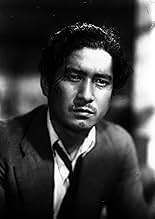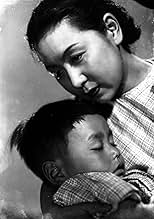PUNTUACIÓN EN IMDb
7,4/10
2 mil
TU PUNTUACIÓN
Un hombre regresa a casa tras la Segunda Guerra Mundial y descubre que su mujer, desesperada, se ha dado a la prostitución para pagar las facturas de la hospitalización de su hijo.Un hombre regresa a casa tras la Segunda Guerra Mundial y descubre que su mujer, desesperada, se ha dado a la prostitución para pagar las facturas de la hospitalización de su hijo.Un hombre regresa a casa tras la Segunda Guerra Mundial y descubre que su mujer, desesperada, se ha dado a la prostitución para pagar las facturas de la hospitalización de su hijo.
- Dirección
- Guión
- Reparto principal
- Premios
- 2 premios y 1 nominación en total
Reseñas destacadas
It is not one of Yasujiro Ozu's best films. Both just after the war he made Record of a Tenement Gentleman (1947) and the Late Spring (1949) but this one comes between these two. The others are fine but not this one, it is not terrible but it is that, we know what is going to happen. The husband is away in the war and she is having to sell her clothes so she can feed her toddler. It gets more sad for her when he is unwell and naturally the hospital bills have to be paid. Even she knows what she will have to do and her friend mentions what she can do. We don't see her prostitute herself but we know and of course her husband is soon back home lazing around and has to find out how she had got the money. Raping her and throwing her down the stairs are because he is rather upset and that he felt unmanly. We can't really comprehend this couple, especially because of the war, but certainly in Japan we can just about understand how it is for them.
10kerpan
Ozu's late film are far more varied than "common wisdom" would have it -- but, by any measure, "Hen in the Wind" (from 1948) is especially "atypical". This is the only Ozu film I've seen (out of 21 or 20) that has a tangible (and even raw) physicality -- it is more like proto-Imamura than "standard" Ozu (no -- Imamura was not yet working as Ozu's assistant -- that only began around 1951). Characters crawl, slither, and slide about. Sometimes, visually oversized bare feet stick into the foreground. Kinuyo Tanaka loses all self possession at the climax, and practically keens her dialog -- at a much higher pitch than I've ever heard her use in any other film.
This is an interesting story that deals with the collateral damage caused by WW2 (and the ensuing occupation) -- as it affected the lives of one young married couple. It was a flop with the audience, I guess -- so it became a path not traveled further. Artistically, it may not be completely successful, but it was a worthy effort.
This is an interesting story that deals with the collateral damage caused by WW2 (and the ensuing occupation) -- as it affected the lives of one young married couple. It was a flop with the audience, I guess -- so it became a path not traveled further. Artistically, it may not be completely successful, but it was a worthy effort.
In postwar Japan, a wife has to deal with the consequence of her decision when she needed her son's hospital charges during her husband's absence. The theme, women's harsh reality at the time, is exceptionally serious for Ozu. It makes Hen in the Wind uniquely and intensely emotional, combined with Ozu's style, such as off-screen actions, implicative montages, and singsong dialogues.
"Record of a Tenement Gentleman" is Ozu's actual first post-war movie, but while it is set in a post-war environment it still relied a lot in his themes of family, father/mother and son, family love that Ozu had always explored, rather than discussing questions from a post-war society.
"A Hen in the Wind" does that. It offers a true war/post-war situation and deals with the people that suffer from it.
The story is quite simple and I've found some of his other movies to be more emotional. However, it is one of his most serious and violent. I do think Ozu is capable of adding more depth to his movies than what we see here, but I was very happy to find a different subject from what he does usually, explored in a such disturbing way. Ozu's themes are pretty much the same all over his work, but "A Hen in the Wind" stands out for a different kind of serious issue. It is, for that, very refreshing.
Very serious, very sad, very human, unexpectedly violent and a touching look at a post-war situation, it stands out mostly for being different from Ozu's usual themes.
"A Hen in the Wind" does that. It offers a true war/post-war situation and deals with the people that suffer from it.
The story is quite simple and I've found some of his other movies to be more emotional. However, it is one of his most serious and violent. I do think Ozu is capable of adding more depth to his movies than what we see here, but I was very happy to find a different subject from what he does usually, explored in a such disturbing way. Ozu's themes are pretty much the same all over his work, but "A Hen in the Wind" stands out for a different kind of serious issue. It is, for that, very refreshing.
Very serious, very sad, very human, unexpectedly violent and a touching look at a post-war situation, it stands out mostly for being different from Ozu's usual themes.
A sensitive and powerful examination of the moral compromises made during World War II and the toll they take on families. Kinuyo Tanaka gives another of her sensitive and compelling performances as a woman forced into prostitution to care for her sick child, and is unable to keep her secret when her husband returns from the front. Ozu takes on the topic of prostitution while steering well clear of its potential for sordidness (something I find both a virtue and a limitation... in some ways it's *too* tactful). The scenes between the two exceptional leads contribute to a film blessed with some of the most uncomortable scenes Ozu has filmed, delving deep into raw unresolved emotions of guilt, honor and devotion.
¿Sabías que...?
- CuriosidadesFrench visa # 159347.
- Citas
Tokiko Amamiya: I'm willing to give mu soul if it means raising my son.
- ConexionesReferenced in Ikite wa mita keredo - Ozu Yasujirô den (1983)
- Banda sonoraYume awaki Tôkyô
Music by Yûji Koseki
Selecciones populares
Inicia sesión para calificar y añadir a tu lista para recibir recomendaciones personalizadas
- How long is A Hen in the Wind?Con tecnología de Alexa
Detalles
- Fecha de lanzamiento
- País de origen
- Idioma
- Títulos en diferentes países
- Una gallina en el viento
- Empresa productora
- Ver más compañías en los créditos en IMDbPro
- Duración1 hora 24 minutos
- Color
- Mezcla de sonido
- Relación de aspecto
- 1.37 : 1
Contribuir a esta página
Sugerir un cambio o añadir el contenido que falta

Principal laguna de datos
By what name was Una gallina al viento (1948) officially released in Canada in English?
Responde
























